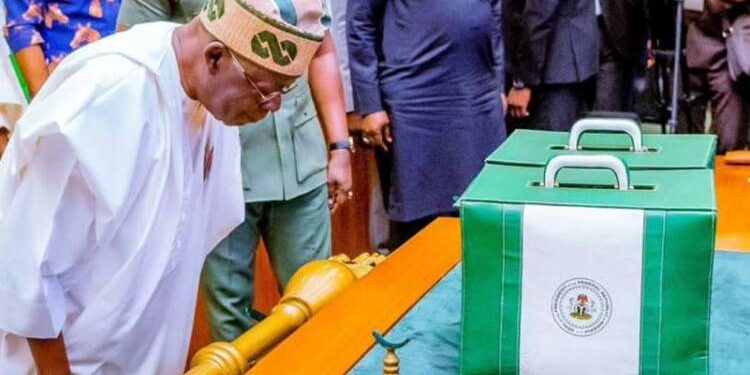…Defence, education, and health receive the largest allocations
…Reason for the N700bn increase – Bichi
The National Assembly has approved the 2025 budget of N54.99 trillion, raising it by N700 billion from President Bola Ahmed Tinubu’s original proposal.
Of the total amount, N3.64 trillion is allocated for statutory transfers, N14.31 trillion for debt servicing, and N13.06 trillion for recurrent (non-debt) expenditure, while N23.96 trillion is designated for capital expenditure.
Last week, President Bola Tinubu wrote to the National Assembly requesting an increase of the initial budget proposal from N49.7 trillion to N54.2 trillion, citing additional revenue from key government agencies.
The passage of the 2025 Appropriation Bill followed the consideration of the report from the Committee on Appropriations in the Committee of Supply, chaired by Speaker Abbas Tajudeen, its adoption in plenary, and the third reading of the bill after suspending relevant House rules.
Among the statutory transfers, the Niger Delta Development Commission received the highest allocation of N626.53 billion, followed by the National Judicial Council with N521.62 billion; the Universal Basic Education Commission with N496.84 billion; the National Assembly with N344.85 billion; the Basic Healthcare Provision Fund with N298.42 billion; and the National Agency for Science and Engineering Infrastructure with N248.42 billion.
Additionally, the North-east Development Commission was allocated N240.99 billion, the North-west Development Commission received N145.60 billion, while the North-central, South-east, South-south, and South-west Development Commissions, as well as the Independent National Electoral Commission, each received N140 billion. The Public Complaints Commission was allocated N14.46 billion and the National Human Rights Commission received N8 billion.
In terms of Recurrent (Non-Debt) Expenditure, the Ministry of Defence received the largest allocation of N2.51 trillion, followed by the Ministry of Education with N1.59 trillion; the Ministry of Police Affairs with N1.22 trillion; the Ministry of Health & Social Welfare with N957.49 billion; the Ministry of Interior with N658.58 billion; the Ministry of Youth with N442.27 billion; the Office of the National Security Adviser with N335.97 billion; the Ministry of Foreign Affairs with N286.88 billion; and the Ministry of Agriculture & Food Security with N155.35 billion.
For Capital Expenditure, the Federal Ministry of Works received the largest allocation of N2.04 trillion, followed by the Federal Ministry of Agriculture and Food Security with N1.95 trillion; the Ministry of Innovation, Science and Technology with N1.20 trillion; the Ministry of Health & Social Welfare with N1.15 trillion; the Ministry of Education with N953.93 billion; the Ministry of Finance with N892.93 billion; the Ministry of Defence with N604.91 billion; and the Ministry of Power with N577.43 billion.
The Chairman of the Appropriation Committee in the House of Representatives, Hon Abubakar Kabir Bichi, explained the N1.2 trillion increase in the budget, noting it was due to the withdrawal of United States health support for Nigeria, discrepancies in detailed estimates, and requests from critical agencies for additional funding.
After the budget was approved, Bichi remarked: “As you know, the United States government has withdrawn its support for some countries in terms of health assistance, and Nigeria is among them. Therefore, the President proactively requested the addition of $200 million, approximately N300 billion, to support the health sector for individuals facing challenges such as tuberculosis, HIV, malaria, and polio.
“Additionally, the executive proposals – detailed estimates and the bill – differed by about N340 billion. Consequently, if you combine this, it totals N640 billion, and we also have legitimate requests from agencies like INEC, NFIU, DSS, and others. This is what resulted in the N700 billion increase.”
In summarising the bill before consideration, the Appropriations Chairman noted that a fiscal deficit of N13.08 trillion and a deficit/GDP ratio of 1.52% were proposed in the budget.
He pointed out the upward revision of the budget from N49.7 trillion to N54.9 trillion to account for discrepancies between the details and the bill, the procurement of vaccines, and additional funding for certain government agencies.
According to the lawmaker, the committee observed that the 2025 Appropriation Bill was presented later than the 2024 Appropriation Bill and urged the executive to present the budget to the National Assembly no later than three months prior to the next financial year.
“The committee hereby recommends that the Executive presents the Budget to the National Assembly no later than three months before the next financial year. This will help return the country to the January-December budget cycle,” he stated.











